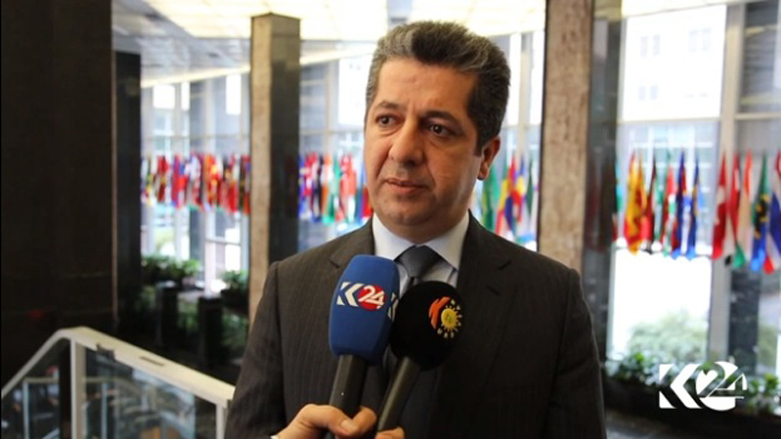IS re-emerging in Iraq, no action from Baghdad: Masrour Barzani

ERBIL, Kurdistan Region (Kurdistan 24) – The Islamic State (IS) is re-emerging in Iraq, including brazen attacks on security forces near Kirkuk, and Baghdad has made no practical steps to resolve the causes of the jihadist group's re-appearance, a senior Kurdish official said on Monday.
Chancellor of the Kurdistan Region Security Council (KRSC) Masrour Barzani arrived in Washington DC on Thursday and held several meetings with US officials, including US President Donald Trump’s National Security Adviser H.R. McMaster at the White House.
Barzani on Monday met with officials from the US State Department which included US Special Presidential Envoy for Global Coalition to Defeat IS Brett McGurk, and Jonathan R. Cohen, Deputy Assistant Secretary of European and Eurasian Affairs, discussing “Erbil-Baghdad relations, confidence-building measures, and the KRG's [Kurdistan Regional Government] role in advancing regional stability.”
He is scheduled to meet with US senators and congressmen in Washington DC, to discuss the current situation in the Kurdistan Region and Iraq.
During an interview with Kurdistan 24, Barzani said, “Militarily, IS is defeated and have lost territory they were in control of, but it does not mean they have been obliterated, since they are now re-emerging in some areas, and have even attacked security forces in Kirkuk Province."
“To eliminate IS and other similar groups, the factors that lead to their rise must be resolved, but, so far, Iraq has made no practical steps in this regard,” he added.
The Kurdish security chief stated that American officials continuously emphasize bilateral relations, and view their ties with Erbil as crucial, due to the geopolitics of the Kurdistan Region in the Middle East.
He specified that the purpose of his visit was to discuss various key issues with Washington officials, such as current cooperation between the Kurdistan Region and the US, the general situation in Iraq, and strained relations between the KRG and the Federal Government of Iraq.
“We have pointed out to them that the Kurdistan Region has fulfilled its responsibilities, and have done so in accordance with articles of the Iraqi Constitution. We believe that Baghdad must now also do its part, especially releasing KRG employees' salaries and lifting the international flight ban on airports in the Kurdistan Region.”
Commenting on last year’s referendum on independence in the Kurdistan Region, which saw 93 percent of voters favoring statehood, Barzani said, “The purpose of such a referendum is to express the desires of the people of a nation and to decide their future and how they want to live. This does not mean that we are being unrealistic and cannot interpret the latest developments in the world.”
“We thought that the referendum would prevent the unfair attacks carried out against the Kurdistan Region. We needed an international guarantee to prevent bloodshed and similar catastrophes that the Kurdish people have faced for decades,” he continued.
“Unfortunately, it was interpreted differently. We believe this interpretation was intentional because there has always been an intention to diminish the authority of the Kurdistan Region, as well as its borders, so they [Baghdad] used the referendum as an excuse. The impact of the referendum did not rise to a level that would justify such an unjust assault on the Kurdistan Region.”
Ties between Erbil and Baghdad have deteriorated considerably since the independence vote, which took place throughout the Kurdistan Region and in some disputed territories, including Kirkuk.
In response, Baghdad enacted collective punitive measures against the Kurdistan Region, including the international flight ban on the two airports within its borders. It also carried out a military operation in which it gained control the oil-rich province of Kirkuk and other disputed territories which had been under the protection of the Peshmerga since 2014.
The embargo has dramatically affected the semi-autonomous region’s economy, forcing many foreign and local companies to close their offices and operations, causing hundreds to lose their jobs.
Over the past few months, many in the Kurdistan Region have held public protests against the sanctions of the Iraqi government, including recent demonstrations by wounded Peshmerga and disabled residents in front of the UN compound in Erbil, in which they call upon the international community to pressure Baghdad to lift the sanctions.
Editing by John J. Catherine
